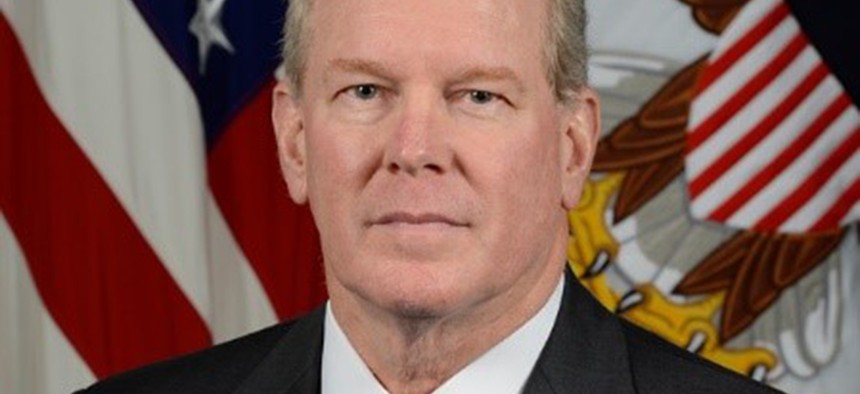Pentagon Deputy Tapped For Powerful New Management Role

Defense Department
The chief management officer position would focus on business reform but include IT and data management responsibilities.
As of Feb. 1, the Defense Department is getting a new, stronger senior management position: the chief management officer.
Thursday night, as the specter of a government shutdown hung over Washington, President Donald Trump announced his intention to nominate John Gibson, the current deputy chief management officer, to be the first to step into this new role.
Before joining the department as deputy CMO last year, Gibson was president and chief executive officer of XCOR Aerospace and served in several management positions with aviation manufacturer Beechcraft. Prior to that, he was the assistant secretary of the Air Force, focused on financial management, and deputy undersecretary of defense for management reform.
The elevation of the DCMO to CMO—a high-ranking position considered third in line to the secretary of defense—was established in the 2017 National Defense Authorization Act, envisioned as the focal point for reforming the Pentagon’s business operations. Additional guidance in the 2018 NDAA clarifies the responsibilities of the new role, including some which were previously under the purview of the CIO.
“The purpose of the CMO is to improve the quality and productivity of the business operations of the department, thereby reducing the costs of those operations,” according to an August 2017 report by the Office of the Secretary of Defense. “The department will use the establishment of the CMO organization as an opportunity to renew focus on business operations reform. The structure of the organization is a modest part of this renewal.”
The idea of a Defense CMO was first put into law by the 2008 NDAA, based on recommendations from the Government Accountability Office. However, at that time Congress declined to make the position stand on its own, instead giving the CMO responsibilities to the deputy secretary of defense and creating the DCMO to assist.
The Business Case for IT
Along with managing and retooling the department’s business operations, the new CMO will also be responsible for leading Defense’s data governance and analytics programs and will chair the newly established Defense Policy Advisory Committee on Technology. That committee will be comprised of industry executives and representatives from the secretaries of each of the services and the Joint Chiefs of Staff with a mandate to “exchange information, including, as appropriate, classified information, on technology threats to the national security of the United States and on the emerging technologies … that may become available to counter such threats,” according to the 2018 NDAA.
Additionally, beginning on Jan. 1, 2019, the CMO will be expected to take over specific responsibilities formerly under the CIO.
The Defense CIO will still serve most of the traditional IT management functions. However, come 2019, the CMO will have purview over the business side of IT, including increasing efficiency through the implementation of new technologies and maintaining and analyzing data sets that can help the department with “improving acquisition outcomes and personnel management.” As the official responsible for improving business operations, Defense and Congress thought it prudent to give the new CMO authority over the IT systems that will be necessary to make those advancements across the department.
“Focusing on delivering enterprise services ensures the department more synergy in planning and executing business operations, while reducing the cost of those operations,” the August 2017 report states.
A Manager’s Manager
The 2018 NDAA—which gives additional guidance on the new position’s role—directs the president to appoint a person with “an extensive management or business background and experience with managing large or complex organizations.” While this seems like an obvious resume requirement, past CMOs within Defense—whether former deputy secretaries or service CMOs—haven’t always met that requirement, according to Douglas Brook, professor emeritus at the Naval Postgraduate School, former director of the Center for Defense Management Research and currently the visiting professor at the Sanford School of Public Policy at Duke University.
“GAO envisioned a CMO with broad management experience, a proven track record of making decisions in complex settings, and direct experience in the department. That does not seem to fit the profile of the initial appointees,” Brook wrote in the Summer 2015 issue of The Public Manager magazine, summarizing the findings of a Center for Defense Management Research study.
In the article, Brook extols the virtues of having a strong manager in the position but notes Defense appointed CMOs at the services whose backgrounds tended to be in policy.
“While bringing diverse experiences to their jobs, few of the 10 holders of these positions between 2009 and 2013 appear to have the kind of background envisioned by the GAO,” he wrote. “Seven had predominantly policy backgrounds, one had a previous management career, and two had combined policy and management experience. Congress apparently has not insisted on broad management experience when approving nominees for Senate-confirmed CMO positions.”
Gibson “comes pretty close” to fulfilling that requirement, Brook told Nextgov in a recent interview, citing the nominee’s “pretty extensive corporate experience outside the Pentagon,” as well as his time in the Office of the Secretary of Defense and the Air Force.
In Brook’s assessment, the challenge for Gibson will be working with the established service CMOs to make real change.
“The CMO really doesn’t manage very much,” he said, noting that most of the day to day work is done at the program level. To be successful, Gibson will “need to be really empowered by the secretary of defense and the deputy secretary,” and will need buy-in from the component chiefs.
But Brook was optimistic, given the nominee’s experience.
“Gibson has experience at both the OSD level and the services,” he said. “So, he’ll be sensitive to the relationships between the service components.”






